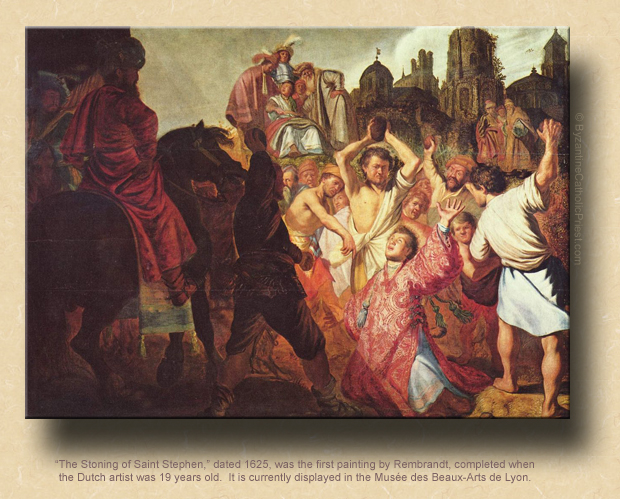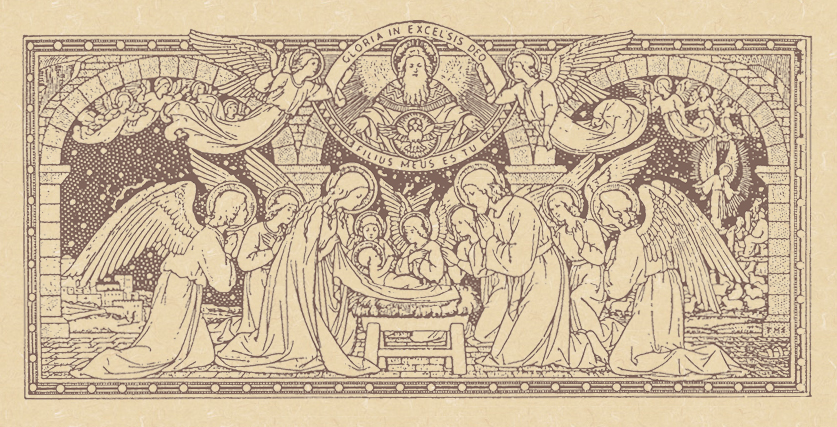The Blood of the Martyrs is the Seed of New Christians.
The Feast of the Archdeacon & Protomartyr, Stephen.
Lessons from the proper, according to the ordinary form of the Roman Rite:
• Acts 6: 8-10; 7: 54-59.
• Psalm 31: 3-4, 6, 8, 16-17.
• Matthew 10: 17-22.
The Second Class Feast of Saint Stephen, Protomartyr.
Lessons from the proper, according to the extraordinary form of the Roman Rite:
• Acts 6: 8-10; 7: 54-59.
• Psalm 118: 23, 86, 117.
• Matthew 23: 34-39.
[In the Byzantine-Ruthenian Rite, today is the Synaxis of the Mother of God, the feast of St. Stephen being observed on December 27th.]
FatherVenditti.com
|
9:04 AM 12/26/2014 —

Today our Church observes the feast of the Deacon and First Martyr, Stephen. He is the first of the seven deacons ordained by the Apostles in Chapter Six of the Acts of the Apostles. He is known as a great preacher, and the Bible speaks of him performing many miracles and cures. At the end of the chapter he is arrested by the Scribes; and, the following chapter is a transcript of his trial, during which he lays out the case for Jesus being the Messiah. He is, of course, convicted of heresy and treason against the Jewish people, and condemned to death by stoning. He is the first person to sacrifice his life for Christ.
Present at his trial is a young Pharisee named Saul. It wasn't long after the death of Stephen that Saul would have his encounter with the Risen Christ on the road to Damascus, and become the Blessed Apostle Paul.
Now, no date is given for Stephen's martyrdom; we only know that it was not long after the first Pentecost. But why celebrate it right after Christmas? And the answer might be found in the Liturgy of the Byzantine Church with which, as you know, I'm very familiar. In the Divine Liturgy there is a hymn sung prior to the readings called the Kontakion; each Kontakion is proper to the Sunday or the feast, and is normally taken from the writings of the Fathers of the Church. In the Kontakion for the feast of St. Stephen the people sing:
Yesterday, in human flesh the Master came to us; today, from the flesh, his servant departs. Yesterday, the King was born in the flesh; today, his servant is killed by stoning. Thus, the holy Stephen, the first martyr, is brought to perfection.*
 Not long after that hymn was composed, that erudite Father of the Western Church, Tertullian, would write, sanguis martyrum semen christianorum—“the blood of the martyrs is the seed of new Christians” (Apol., 50, 13: CCL 1, 171). Stephen's death marks the beginning of the wholesale persecution of the Church, but it also marks the beginning of the Church's phenomenal growth. The sight of so many men and women willingly—even joyfully—going to their deaths rather than deny the divinity of Christ would draw more converts into the Church than even the greatest sermons of the greatest saints. The best preaching is done by example; and, what better example could their be than death? Not long after that hymn was composed, that erudite Father of the Western Church, Tertullian, would write, sanguis martyrum semen christianorum—“the blood of the martyrs is the seed of new Christians” (Apol., 50, 13: CCL 1, 171). Stephen's death marks the beginning of the wholesale persecution of the Church, but it also marks the beginning of the Church's phenomenal growth. The sight of so many men and women willingly—even joyfully—going to their deaths rather than deny the divinity of Christ would draw more converts into the Church than even the greatest sermons of the greatest saints. The best preaching is done by example; and, what better example could their be than death?
We celebrate the death of Stephen at Christmas time because giving one's life for Christ is the logical conclusion to the Gospel. In a certain sense, one could say that the first seven chapters of the Acts of the Apostles, written by St. Luke and ending with the death of Stephen, are the final chapters of Luke's Gospel. From that point on, the Apostles would spread out throughout the world, establishing Churches, baptizing converts, ordaining priests and bishops; all but one of them would, one by one, also give their lives in martyrdom for Christ, until that day that the emperor Constantine would convert to Christianity and make it the law of the land.
What I would offer for your reflection today is to view all this in light of the current situation in which we find ourselves as a Church. For almost the last two hundred years Christianity held a prominent place in our country; but, what was once a Christian country clearly isn't any longer, and it seems we are entering into a new era of Christian persecution. Abortion and other sins against human life are so common that even Catholics now think it's their prerogative to decide such issues for themselves; in state after state marriage is being redefined so as to make the family, the very cell of the Church, a thing of the past; the moral teachings of the Gospel are openly ridiculed in almost every form of entertainment media; the Holy Priesthood is viewed with suspicion. And in a climate such as this, it is very easy to become despondent, and see nothing but a bleak future for both our Church and our country.
But I would challenge that. I choose, instead, to see something extraordinary happening. As the lines between clear good and clear evil are drawn more boldly every day, I see Christians, albeit fewer in number, more forcefully proclaiming and defending the Gospel of Jesus Christ than ever before. I see them willing to suffer for Christ in a way that Christians haven't been called on to do for centuries. I see the pattern, which began with the death of Stephen, and which has been replayed by Christians so many times throughout Church history, beginning to be replayed again. And if we are blessed to witness the beginning of another era of anti-Christian persecution, why suppose that it will end any differently than any time before? Will it not end, as it always has in the past, with the triumph of the Church over her enemies?
Today we celebrate God becoming a man, the birth of Jesus Christ. In doing so, we also celebrate our own rebirth. If, as Tertullian said, the blood of the martyrs is the seed of new Christians, then let it flow, and let us see in this new era the rebirth of the Church like the sprig from the root of Jesse, who is Christ himself.

* Cf. Lesson iv for Matins according to the extraordinary form of the Roman Rite, from Sermon 3, on St. Stephen, by St. Fulgentius, Bishop:
"Yesterday we were celebrating the birth in time of our Eternal King; to-day we celebrate the victory, through suffering, of one of His soldiers. Yesterday our King was pleased to come forth from His royal palace of the Virgin's womb, clothed in a robe of flesh, to visit the world; to-day His soldier, laying aside the tabernacle of the body, entereth in triumph into the heavenly palaces. The One, preserving unchanged that glory of the Godhead which He had before the world was, girded Himself with the form of a servant, and entered the arena of this world to fight sin; the other taketh off the garments of this corruptible body, and entereth into the heavenly mansions, where he will reign for ever. The One cometh down, veiled in flesh; the other goeth up, clothed in a robe of glory, red with blood."
|

